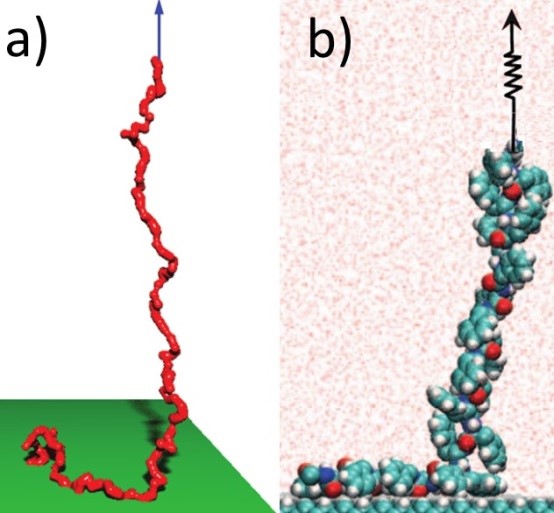Call for applications
scholarship in physical sciences
Unit of the project realization: Faculty of Science and Technology – University of Silesia in Katowice
Unit realizing the PhD student education: Doctoral School at the University of Silesia in Katowice
The scholarship applies to theoretical research of molecular friction of polymers in dilute and concentrated solutions. The main tool of research are molecular dynamics simulations.
The research will be carry out within the project funded by the National Center Science: “Molecular spectroscopy of polymer chains” (2019/35/O/ST3/00936) under supervision of dr. hab. Jarosław Paturej, prof. UŚ. The research is a collaboration work between the University of Silesia and Leibniz Insitute for Polymer Research (IPF) in Dresden (Germany). It is expected from the PhD candidate to carry out some of the research tasks during six month visit at the IPF.
Duration of the scholarship: 48 months
Scholarship amount:
- 4,266.58 PLN (for the first 24 months),
- 5,119.89 PLN (for the last 24 months)
Requirements:
- Master of science in the field of physics, chemistry or related sciences.
- Proficiency in programming language (C, Fortran or Python)
- Proficiency in English that allows for publishing research results.
- High motivation to carry out research.
- Documented scientific track record will an advantage.
Required documents:
- Cover letter with description of scientific interests
- CV
- List of publications
- The copy of MSc
- Two reference contacts.
Candidates should register in IRK system and select „Doctoral School – admission by grant and implementation doctorate program”.
Documents should be delivered till 16.09 2021 to an e-mail: jaroslaw.paturej@us.edu.pl
In case of any questions, before the formal application please contact to the grant leader for the e-mail address given above.
Documents will be rated by the commission, led by the project leader. Admission will be carried out according to the NCN regulations. Admission can be carried out both in Polish and in English. Meeting will be organized on 20.09 2021 in the Doctoral School office / on-line. Final decision will be sent to candidates via e-mail till 24.09. 2021.
Project description:
Polymers are macromolecular compounds comprised of many repeated elementary subunits called monomers. Polymers are important class of materials belonging to soft condensed matter. Polymers are widespread. Synthetic macromolecules are inevitable ingredients of commonly used materials, including plastics, rubbers, fibers, textiles, resins, glues and many others. Large group of materials which are biological in origin also contains polymers. These are for instance proteins, nucleic acids (DNA) or polysacharides (starch). Of particular importance for polymer sciences is theoretical description of macromolecule conformation, i.e. spatial polymer configuration. Many physical properties are manifestations of the underlying polymer conformation. The main scientific goal of this proposal is to develop simulation models that would improve understanding of the mechanical properties of biological and synthetic polymers by measuring the dynamics (frequency-dependent molecular friction and stiffness) of individual biopolymer and synthetic polymer chains. The dynamics will be determined over a large range of frequencies and length-scales as a function of chemistry of the polymer, types and concentrations of solutes (including polymers), solvent, and tension of the test chain using novel computational multiscale modeling. The dynamics of materials is traditionally characterized by the storage and loss modulus, which are determined from macroscopic measurements of the in-phase and out-of-phase response of materials, such as polymer solutions, melts, networks consisting of large collections of molecules. In this project, we propose to directly measure the microscopic in-phase and out-of-phase response of an individual molecule. The need to understand the properties of individual molecules has stimulated the recent surge in interest in single molecules mechanics methods, such as single molecule atomic force microscopy (AFM), optical trap or magnetic bead methods and the so-called correlation force spectroscopy (CFS). Mechanical spectroscopy provided by the CFS technique allows investigation of polymer modulus (in-phase correlations) and friction (out-of-phase correlations). Polymer friction is the dissipation that occurs when a polymer changes its conformation or position with respect to the surrounding environment. In dilute solution there are two components: intermolecular friction against the solvent and intramolecular friction between segments of the same polymer. Molecular friction provides insights into macroscopic synthetic systems such as oscillatory shear of melts or the friction in thin films. It is also crucial for many biological processes that occur in the crowded environment of the cell, for example the stretching and shearing of DNA that occurs during replication.






